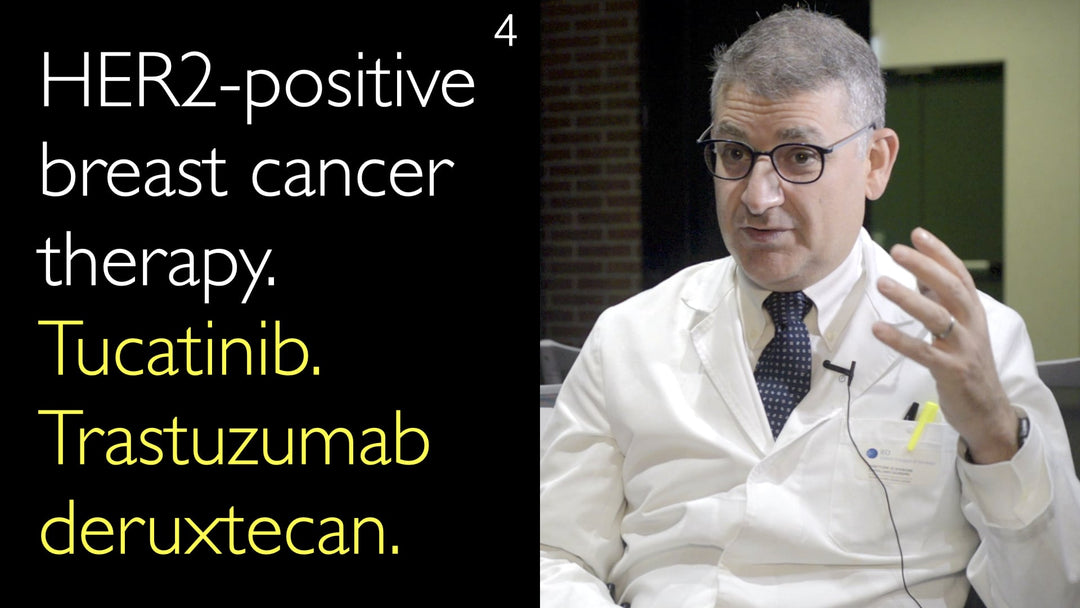Leading expert in HER2-positive breast cancer therapy, Dr. Giuseppe Curigliano, MD, explains the latest advancements in treating this aggressive breast cancer subtype. He details the significant role of new agents like the tyrosine kinase inhibitor tucatinib for brain metastases and the transformative potential of the antibody-drug conjugate trastuzumab deruxtecan, which is poised to become a new standard of care in both metastatic and early-stage settings, potentially curing some patients with oligometastatic disease.
Advanced HER2-Positive Breast Cancer Treatment: New Therapies and Future Directions
Jump To Section
- HER2-Positive Breast Cancer Overview
- Tucatinib for Treatment and Brain Metastases
- Trastuzumab Deruxtecan and ADC Potential
- A New Standard of Care in First-Line Treatment
- Curing Oligometastatic Breast Cancer
- The Future of Early-Stage HER2-Positive Treatment
- Antibody-Drug Conjugates to Replace Standard Chemo
HER2-Positive Breast Cancer Overview
HER2-positive breast cancer accounts for up to 20% of all breast cancer diagnoses. As Dr. Giuseppe Curigliano, MD, explains, this subtype is historically known for its aggressive behavior and was associated with a worse prognosis. The conversation with Dr. Anton Titov, MD, focuses on how modern therapies are fundamentally changing this narrative and improving patient outcomes.
Tucatinib for Treatment and Brain Metastases
One of the most promising new medications is tucatinib, a small-molecule tyrosine kinase inhibitor. Dr. Giuseppe Curigliano, MD, highlights that tucatinib has demonstrated a significant overall survival and progression-free survival benefit in the third-line treatment setting for metastatic HER2-positive breast cancer. A critical advancement is its efficacy for patients with metastatic brain lesions, which represents a major unmet medical need in oncology.
Trastuzumab Deruxtecan and ADC Potential
The other groundbreaking therapy discussed is trastuzumab deruxtecan. This drug is an antibody-drug conjugate (ADC) designed to deliver chemotherapy directly to HER2-positive cancer cells with high potency. Dr. Giuseppe Curigliano, MD, describes it as a highly effective treatment for HER2-positive disease. Its targeted mechanism offers increased efficacy while potentially reducing the side effects associated with traditional chemotherapy.
A New Standard of Care in First-Line Treatment
According to Dr. Curigliano, trastuzumab deruxtecan has the potential to become a new standard of care in the first-line setting for metastatic HER2-positive breast cancer. This opinion is based on its impressive clinical performance, which could shift treatment paradigms away from older regimens. Dr. Giuseppe Curigliano, MD's perspective underscores a significant evolution in how oncologists approach this disease from the moment of a metastatic diagnosis.
Curing Oligometastatic Breast Cancer
A particularly hopeful insight from Dr. Curigliano is the potential for cure. He states, "I am quite sure that if we treat all oligometastatic breast cancer diseases, some of these patients can be potentially cured with this new type of approach." This statement marks a dramatic shift from viewing metastatic breast cancer as solely a chronic, incurable condition to one where achieving long-term remission or cure is a tangible goal for a subset of patients.
The Future of Early-Stage HER2-Positive Treatment
The innovation is not limited to metastatic disease. Dr. Curigliano confirms that clinical trials are on the horizon for early-stage, primary HER2-positive breast cancer. New research will investigate using antibody-drug conjugates like trastuzumab deruxtecan in the neoadjuvant setting, which is treatment given before surgery. These trials will directly compare the ADC to the current standard neoadjuvant chemotherapy, which is a combination of trastuzumab and pertuzumab.
Antibody-Drug Conjugates to Replace Standard Chemo
Dr. Giuseppe Curigliano, MD, concludes with a visionary statement on the future of cancer treatment. He believes that "antibody-drug conjugates will be new smart chemotherapies that will substitute completely standard chemotherapy in the future." This signifies a move towards more targeted, effective, and potentially less toxic treatments across oncology. The dialogue with Dr. Anton Titov, MD, captures a pivotal moment where these "smart" therapies are beginning to redefine patient care and outcomes.
Full Transcript
Dr. Anton Titov, MD: HER2-positive breast cancer is diagnosed in up to 20% of all breast cancer cases. HER2-positive breast cancer tends to be more aggressive, so it might have a worse prognosis historically.
Dr. Anton Titov, MD: What are the nuances of HER2-positive breast cancer therapy that we can observe today? What are some advanced treatments on the horizon in the near future?
Dr. Giuseppe Curigliano, MD: I believe there are two most promising medications for HER2-positive breast cancer. One is already in current use: it is Tucatinib, a small-molecule tyrosine kinase inhibitor. It demonstrated in the third-line setting an overall survival and progression-free survival benefit.
Also, in patients with metastatic brain lesions from breast cancer, that is an unmet medical need. And the other drug is for sure trastuzumab deruxtecan. This is an antibody-drug conjugate with very high potency for HER2-positive disease.
In my opinion, trastuzumab deruxtecan can potentially be a new standard of care in the first-line setting of HER2-positive breast cancer. Let me also tell you this: I am quite sure that if we treat all oligometastatic breast cancer diseases, some of these patients can be potentially cured with this new type of approach.
In my opinion, antibody-drug conjugates will be new smart chemotherapies that will substitute completely standard chemotherapy in the future.
Dr. Anton Titov, MD: So this mostly applies to metastatic advanced HER2-positive breast cancer. Is there anything on the horizon for the early primary diagnosis of HER2-positive breast cancer?
Dr. Giuseppe Curigliano, MD: Yes, we will start with a new clinical trial using antibody drug-conjugate in the neoadjuvant setting for HER2-positive breast cancer. The idea is to compare trastuzumab deruxtecan to standard chemotherapy, which is Trastuzumab and Pertuzumab, in early HER2-positive breast cancer patients.




